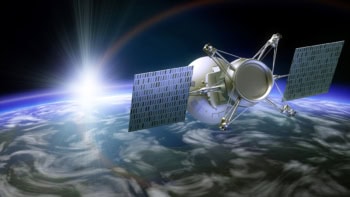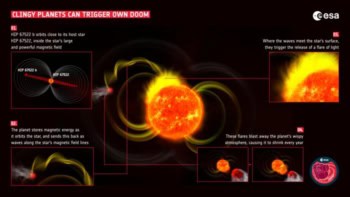A dozen years on, the priority dispute over the discovery of dark energy is still instructive, says Robert P Crease

As a philosopher of science, I love priority disputes. They invite one to ask “How can it be that brilliant scientists agree that they’ve discovered something, but not when?” The answer instructs philosophers about the nature of discovery – and no true scientist can object to learning more about that. Indeed, the discovery of dark energy has been so contentious that debate over who did what and when still rumbles on a dozen years after the event.
Such were the disputes over the matter that a previous column by me, which earnestly tried to do justice to the topic, went through more than 20 drafts (December 2007’s “Dark Energy”). The most recent resurgence of the squabble was instigated by a seemingly innocuous column in the January 2009 issue of APS News. Entitled “This month in physics history”, it stated that word of “accelerating expansion” emerged after a press conference at the January 1998 meeting of the American Astronomical Society in Washington, DC.
The February issue of APS News carried a letter disputing that remark. It was written by Robert Kirshner from Harvard University, who was a member of the High-Z Supernova Search Team – one of the two teams of supernova hunters that discovered that the expansion of the universe is accelerating. “We should mark the dates of scientific discoveries from the submission of refereed publications,” Kirshner wrote, “not commemorate the extrapolations of reporters who get ahead of prudent scientists in drawing reliable conclusions.” The High-Z team’s submission date, as the reader may guess, was earlier than that of the other discovery team, the Supernova Cosmology Project (SCP).
The April 2009 issue of APS News carried replies. One, by Penn State University astronomer Ruth Daly, quoted her press release for the meeting explicitly stating that her results show that the universe “will expand at a faster and faster rate”. The other was by historian Michael Riordan from the University of California, Santa Cruz, who recalled being present at a still earlier event – a physics colloquium in December 1997 – at which SCP member Saul Perlmutter exhibited data indicating expansion, and hearing an audience member state that “these results implied the previously unthinkable: the need for a cosmological constant”.
Kirshner replied in July. The editors of APS News allowed Riordan a reply, before they declared the discussion closed. I am hoping it will continue elsewhere, for the debate reveals some fascinating insights into the role of techniques and technique-borrowing in discovery.
Perspectives on discovery
Kirshner is the principal warrior in this dispute, with virtually all others in both collaborations willing to share credit. From his perspective, publication is the sole indicator of discovery. The argument in favour of using a paper’s submission date to establish priority is that publication is a time stamp indicating that the results have been carefully checked. It is a sign that the results can be trusted. It is not an absolute guarantee – trust never is – but it is the firmest possible statement that “we did all the checks” by those in a position to make them.
Riordan’s letter, however, suggests that publication is not the sole indicator of discovery. Publication is retrospective; it says, “we already did the checks”. Moreover, a publication date is often artificial; these days, by the time a paper is published a preprint version has already been posted and circulated. Moreover, checks can drag on – when, for instance, you have to wait until supernovae die so that you can get a good background to subtract, and when, as in the SCP group’s case, you have more data to evaluate than other teams.
This can make it arbitrary to pin the complex discovery process solely to date of publication – like saying you only know how to drive when you get your licence. In essence, the dispute is not empirical but conceptual. The issue of exactly when dark energy was discovered will not be settled by more letters about submission dates and priority, nor by further details of when members of the SCP collaboration saw and transmitted news that their data showed accelerating expansion.
At the heart of this episode is an ambiguity in the meaning of discovery. Historians have long known that discoveries are not simple, unitary events made by a specific person or group at a specific place or time. Discovery is often distributed among groups, and in space and time, in a way that makes pinning it down contrived.
The philosopher Thomas Kuhn once described two kinds of discovery cases, “simple” and “complex”. In simple cases, what is discovered is predicted by theory; discoverers know pretty much what to look for and the criteria are clear for knowing when the goal is reached. Here, priority debates tend to be few. (Think of, say, the discovery of Pluto.) Complex cases catch the profession by surprise. Something emerges into scientific awareness slowly and confusedly, like when we first catch sight of something from a bad angle and have to shift position several times before we can confidently recognize it. (Think of the cosmic microwave background.) These cases do not involve confirming a prediction, and signs for completing a discovery can be unclear.
So where on the continuum between these two cases does the dark-energy discovery fit, and why? Part of the answer has to do with the growing role of statistics and systematics in astronomy discoveries. When a discovery emerges slowly from statistics along with uncertainties, as it did in this case, it is particularly hard to pin down the moment of discovery.
The critical point
The dispute invites us to ask one final question: “Why is it sometimes not easy for scientists to share credit, or to follow the adage that, if you really want to get something done, let others take credit?” The answer has to do with the role of prestige and reputation in science. These play a role in getting prizes, and – especially when funding for expensive future projects is involved – securing the resources for doing more and better science. Which true scientist is not interested in that?
• See “Dark energy: how the paradigm shifted” pp32–37, print edition only.



